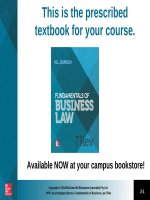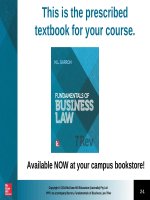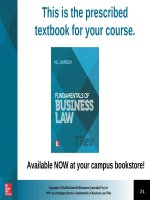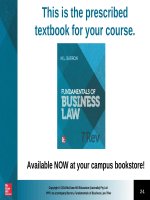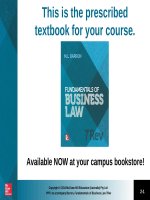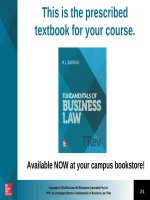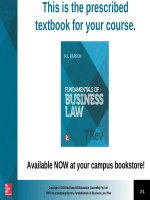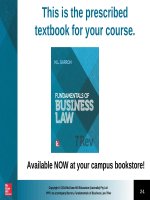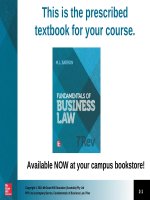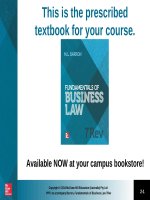- Trang chủ >>
- Thạc sĩ - Cao học >>
- Luật
Lecture Fundamentals of business law (7/e): Chapter 22 - M.L Barron
Bạn đang xem bản rút gọn của tài liệu. Xem và tải ngay bản đầy đủ của tài liệu tại đây (514.41 KB, 33 trang )
This is the prescribed
textbook for your course.
Available NOW at your campus bookstore!
Copyright © 2014 McGraw-Hill Education (Australia) Pty Ltd
PPTs to accompany Barron, Fundamentals of Business Law 7Rev
•2-1
Workplace relations law
Chapter 22
Copyright © 2014 McGraw-Hill Education (Australia) Pty Ltd
PPTs to accompany Barron, Fundamentals of Business Law 7Rev
•2-2
Learning objectives
At the end of this chapter you should
understand:
• the interaction between workplace relations law and
employment law
• the principal sources of Australian workplace relations law
• the workplace relations systems in Australia
• the major public policy factors that underpin workplace
relations law
• the role that international standards play in workplace
relations law
• the major common features of Australian workplace
relations systems
• the main objects of the Fair Work Act 2009 (Cwlth)
• the content of the National Employment Standards
Copyright © 2014 McGraw-Hill Education (Australia) Pty Ltd
PPTs to accompany Barron, Fundamentals of Business Law 7Rev
•2-3
Learning objectives (cont.)
• the way in which an enterprise agreement is distinguished
from a common-law contract of employment
• the way in which an enterprise agreement is distinguished
from an award
• the major functions of Fair Work Australia and the Office
of the Fair Work Ombudsman, including workplace
inspectors
• the major roles, rights and responsibilities of trade unions
in workplace relations law
• the circumstances in which industrial action is and is not
lawful
• the principal remedies against unlawful industrial action
and the methods of enforcing workplace relations rights.
Copyright © 2014 McGraw-Hill Education (Australia) Pty Ltd
PPTs to accompany Barron, Fundamentals of Business Law 7Rev
•2-4
Introduction
• Australian law governing the employer–
employee relationship goes beyond
common-law contractual principles.
• There exists a further body of law:
workplace relations law.
• This law concerns not just the contractual
relationship between an employer and an
employee but also the broader framework
that creates and enforces minimum rights
and obligations in the workplace.
Copyright © 2014 McGraw-Hill Education (Australia) Pty Ltd
PPTs to accompany Barron, Fundamentals of Business Law 7Rev
•2-5
Sources of workplace relations
law
• Australian workplace relations
systems are created by statute, not
the courts.
• All states (except Victoria) and the
Commonwealth have their own
statutory workplace regulation
systems.
• Victoria has referred its powers to
the Commonwealth.
Copyright © 2014 McGraw-Hill Education (Australia) Pty Ltd
PPTs to accompany Barron, Fundamentals of Business Law 7Rev
•2-6
National workplace relations
system
• From 1 January 2010, New South Wales,
Queensland, South Australia and Tasmania referred
law-making power with respect to industrial relations
to the federal parliament to create a national
workplace relations system.
• Foundation of this system is the Fair Work Act 2009
(Cwlth)
• State industrial relations legislation still exists and
covers a minority of employees.
Copyright © 2014 McGraw-Hill Education (Australia) Pty Ltd
PPTs to accompany Barron, Fundamentals of Business Law 7Rev
•2-7
Features of Australian workplace
relations law
• Legislation establishes the system
• Legislation has industrial, social and economic
objectives
• Mandatory minimum terms, relating to both wages
and conditions of employment are imposed on
common law contracts by statue or by industrial
awards made by industrial tribunals
• Creation of industrial tribunals with power to make
industrial awards on defined matters, and to varying
degrees, compulsorily conciliate and arbitrate
industrial disputes
Copyright © 2014 McGraw-Hill Education (Australia) Pty Ltd
PPTs to accompany Barron, Fundamentals of Business Law 7Rev
•2-8
Features of Australian workplace
relations law (cont.)
• Regulation of the role of trade unions and employer
associations
• Recognition, to varying degrees, of the right to
enterprise bargaining
• Protection, to varying degrees, freedom of
association (i.e. voluntary unionism)
• Creation of specific rights and obligations concerning
the termination of employment
• Provisions relating to compliance, remedies and
enforcement of rights and obligations in workplace
relations
Copyright © 2014 McGraw-Hill Education (Australia) Pty Ltd
PPTs to accompany Barron, Fundamentals of Business Law 7Rev
•2-9
Objects of workplace relations law
• Provide rights and obligations not available at
common law
• Codify and expand the common law
• Provide rights and obligations across the workforce
• Redress what is regarded as unequal bargaining
power in contractual negotiations between an
employer and an employee
• Continually changes in response to developments in
economic, global, political, technological, workplace
and industry conditions
Copyright © 2014 McGraw-Hill Education (Australia) Pty Ltd
PPTs to accompany Barron, Fundamentals of Business Law 7Rev
•2-10
Fair Work Act 2009 (Cwlth)
• Primary workplace relations legislation in Australia
• Its application provides a single set of national laws
that govern workplace relations across Australia.
• Employees covered are those employed:
– by a constitutional corporation
– in Victoria, Northern Territory or Australian Capital Territory
– by sole traders, partnerships, other unincorporated entities
and non-trading corporations in New South Wales,
Queensland, South Australia and Tasmania
– by the Commonwealth or a Commonwealth authority
– as waterside, maritime or flight crew employees in
connection with overseas trade or commerce.
Copyright © 2014 McGraw-Hill Education (Australia) Pty Ltd
PPTs to accompany Barron, Fundamentals of Business Law 7Rev
•2-11
National Employment Standards
(NES)
• A safety net of ten enforceable minimum
employment terms and conditions applicable
from 1 January 2010
• Cannot be altered by an employer
• Together with pay rates in modern awards
and minimum wages provide guaranteed
minimum employment terms and conditions
Copyright © 2014 McGraw-Hill Education (Australia) Pty Ltd
PPTs to accompany Barron, Fundamentals of Business Law 7Rev
•2-12
National Employment Standards
(cont.)
1. Maximum weekly hours of work
2.Requests for flexible working arrangements
3.Parental leave and related entitlements
4.Annual leave
5.Personal/carer’s leave and compassionate leave
6.Community service leave
7.Long service leave
8.Public holidays
9.Notice of termination and redundancy pay
10.Provision of Fair Work Information Statement
Copyright © 2014 McGraw-Hill Education (Australia) Pty Ltd
PPTs to accompany Barron, Fundamentals of Business Law 7Rev
•2-13
Regulation by industrial awards
• An industrial award is a legally binding order
relating to industrial matters, including both wages
and conditions of employment made by an industrial
tribunal.
• A modern award is an industry or occupation based
set of minimum employment standards made by Fair
Work Australia. Following simplification and
reduction of existing federal awards, there are now
122 modern awards.
• Modern awards cover all employers and employees
working in industries/occupations covered by a
modern award who earn less than $108 300.
Copyright © 2014 McGraw-Hill Education (Australia) Pty Ltd
PPTs to accompany Barron, Fundamentals of Business Law 7Rev
•2-14
Modern awards
• Making of awards
– Compliance with relevant legislation and administrative
law principles of natural justice
– Utilises conciliation and arbitration
• Parties bound by awards
– Award coverage attaches to the type and place of
work, and to employees and employers within:
a defined industry sector
an occupational group
a specific geographic area.
Copyright © 2014 McGraw-Hill Education (Australia) Pty Ltd
PPTs to accompany Barron, Fundamentals of Business Law 7Rev
•2-15
Modern awards (cont.)
• Duration and cancellation of awards
– Specified duration when made
– Cancellation by industrial tribunal (rare)
• Variation of award
– By the industrial tribunal that made it
• Interpretation of awards
– By federal and state courts
• Award test cases
– Allow general rulings of principle to be laid down
Copyright © 2014 McGraw-Hill Education (Australia) Pty Ltd
PPTs to accompany Barron, Fundamentals of Business Law 7Rev
•2-16
Fair Work Act and common-law
contracts
• From 2010 individual statutory agreement-making
prohibited i.e. previously Australian Workplace
Agreements or Individual Transitional Employment
Agreements
• Fair Work Act provides that common law contracts
negotiated by employees whose annual earnings
exceed a threshold of $113 800 need not comply
with award conditions, although they will be subject
to the NES.
• Reflects rationale that employees in this income
bracket do not require the protection of awards as
may be required by more vulnerable workers.
Copyright © 2014 McGraw-Hill Education (Australia) Pty Ltd
PPTs to accompany Barron, Fundamentals of Business Law 7Rev
•2-17
Enterprise agreements
• Collective agreements only—must be made by a
group of employees and the employer/s and not by
an individual employee and employer.
• Such agreements should be the product of
negotiation.
• Three types of agreement under the Fair Work Act:
– Single-enterprise agreements made between a
single employer and group of employees
– Multi-enterprise agreements made between two
or more employers and groups of their employees
– Greenfields agreements—single or multienterprise agreements relating to genuinely new
enterprises before any employees covered by the
agreement are employed
Copyright © 2014 McGraw-Hill Education (Australia) Pty Ltd
PPTs to accompany Barron, Fundamentals of Business Law 7Rev
•2-18
Enterprise agreements (cont.)
• Following notification, negotiation and voting
processes, an enterprise agreement must be lodged
with Fair Work Australia for approval.
• Fair Work Australia must be satisfied that the
agreement meets the ‘better off overall test’ – that
all affected employees will be better off than under
the relevant modern award.
• The Fair Work Act imposes an obligation on anyone
involved in the bargaining process to act ‘in good
faith’.
• Bargaining representatives may include unions,
employee consultative groups or other agents.
Copyright © 2014 McGraw-Hill Education (Australia) Pty Ltd
PPTs to accompany Barron, Fundamentals of Business Law 7Rev
•2-19
State statutory employment
agreements
• All state workplace relations systems recognise
employment agreements under their legislative
schemes, but with varying characteristics.
• The Fair Work Act provides that a modern award or
enterprise agreement prevails over a law of a state
or territory.
• This is subject to exceptions in regards to
occupational health and safety, workers’
compensation and training arrangements.
Copyright © 2014 McGraw-Hill Education (Australia) Pty Ltd
PPTs to accompany Barron, Fundamentals of Business Law 7Rev
•2-20
Registered organisations
• The Fair Work (Registered Organisations)
Act 2009 (Cwlth) deals with the registration
and accountability of unions and employer
associations in the national system.
• When a trade union or employer association
is registered by Fair Work Australia it is
known as a registered organisation and
obtains certain statutory rights and
obligations under the national system.
Copyright © 2014 McGraw-Hill Education (Australia) Pty Ltd
PPTs to accompany Barron, Fundamentals of Business Law 7Rev
•2-21
Registered organisations (cont.)
• Registered organisations must comply with statutory
requirements in relation to financial affairs,
compliance with its rules and elections and ballots for
members.
• Freedom of association is specifically upheld by.
the provisions of the Fair Work Act—the choice as
to whether to belong to an organisation or not.
• The Fair Work Act provides injunctions and heavy
penalties for conduct by employers, employees,
independent contractors, employer associations or
trade unions which breach the freedom of
association provisions.
Copyright © 2014 McGraw-Hill Education (Australia) Pty Ltd
PPTs to accompany Barron, Fundamentals of Business Law 7Rev
•2-22
Rights of registered organisations
• The right to initiate proceedings in industrial
tribunals such as dispute notification and
resolution.
• The right to be a bargaining representative when
negotiating enterprise agreements.
• The right to initiate some legal proceedings on
behalf of members.
• The right to engage in protected industrial action.
• Rights of entry for trade union officials under
specific limited conditions to enter workplaces and
inspect employment records and the work
environment.
Copyright © 2014 McGraw-Hill Education (Australia) Pty Ltd
PPTs to accompany Barron, Fundamentals of Business Law 7Rev
•2-23
Statutory workplace relations
bodies
• Conciliation and arbitration bodies (such as
industrial tribunals including Fair Work
Australia)
• Bodies with specific powers to approve
agreements or investigate complaints (such
as the Office of the Fair Work Ombudsman)
• Courts with power to enforce rights (such as
the Federal Court of Australia)
Copyright © 2014 McGraw-Hill Education (Australia) Pty Ltd
PPTs to accompany Barron, Fundamentals of Business Law 7Rev
•2-24
Fair Work Australia
•
Replaced and assumed most of the functions of the Australian
Industrial Relations Commission as the principal conciliation
and arbitration body in the national workplace relations
system.
Functions:
•
Has responsibility for minimum wages in the national
workplace relations system
•
Deals with cases of unfair and unlawful dismissal
•
Deals with the resolution of industrial disputes and applications
for protected industrial action
•
Makes and deals with modern awards
•
Decisions must take into account public interest including the
state of the national economy.
Copyright © 2014 McGraw-Hill Education (Australia) Pty Ltd
PPTs to accompany Barron, Fundamentals of Business Law 7Rev
•2-25
